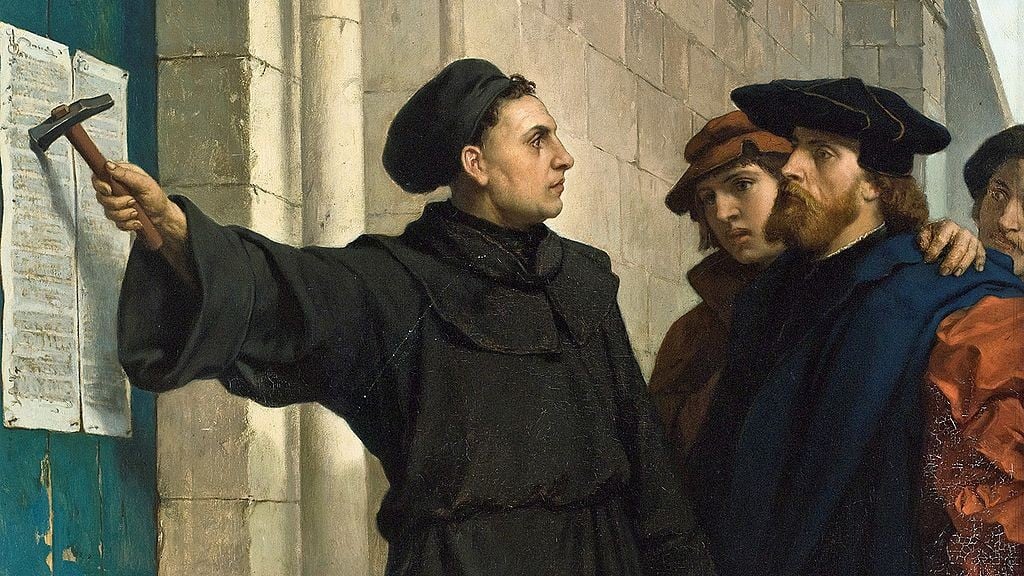
The origins of the Great Fast, I am told, lie in the catechumenate. In anticipation of baptism at Pascha, catechumens were instructed to fast in preparation, and as I was told during my catechumenate, the entire church began to fast in solidarity with the catechumens, using the time as a penitential season to prepare together for the celebration of the Lord’s resurrection. When we fast from vertebrates and anything that comes from a vertebrate (including the olive oil and wine that used to be held in animal skins), we remember our own catechumenates, our own journey to baptism into the fullness of the Catholic Church.
For me to remember my catechumenate – in my case, a journey toward chrismation, as my evangelical baptism with water and the Trinitarian formula is considered valid in the Church – is also to remember from where I came: Protestantism. My Protestant journey is very complicated: one could say that I was from Chinese evangelicalism, but this is only partially true, with all the various intersections of Latino Pentecostalism and the black church through it; for the last eight years of my Protestant life, I had been received by confirmation into the Anglican Communion and therefore into all of its various and glorious fractures as well.
This last week, I have been plunged into the memory of from where I came in a very visceral way. Indignant at how both the Latin hierarch in Vancouver with whom I am in full communion and my evangelical friends were victims of what I called the ‘double blackmail’ of the Franklin Graham visitation to Vancouver, I wrote one very long piece against the ineffective ‘ecumenical’ opposition to Graham, one short reflective piece reflecting on the ‘hollow completeness’ I felt while writing it, and another long piece on the ‘double blackmail’ itself. Although I have tried to be very careful to locate myself within the Kyivan Church where my hierarch in Vancouver did not sign any of the letters, I have found that at best Protestants reading these pieces think I’m quirky and at worse think I have an axe to grind.
Being plunged back into the discursive world of contemporary Protestantism has reminded me of the paranoia of much of this world that I used to inhabit. For some reason, anything that one writes publicly in such a world must have an ‘end game’ or an ‘end goal,’ an agenda that one wants to accomplish and that one’s readers seek to discern in order to pin one down and expose one’s impurity. While many of my friends expressed their gratefulness for my analysis, others were not so happy, seeking instead to perform a kind of perverse therapy in order to make me confess my agenda almost as a damnable sin.
This kind of objective-based thinking strikes me as very odd, and I do not know whether it is because I am Eastern Catholic and therefore really couldn’t care less about helping Protestants get their house in order or because I am an academic and really can’t be bothered to give practical solutions to anything. After all, I wrote out of love for my fellow Catholics because the Latin hierarch has been implicated, and while I am happy that so many Protestants seem to be reading, I really have no idea how I can be helpful to Protestants because I am most certainly not one and not interested in being one again, except to say that perhaps we might work together as persons in Christ walking together to maybe one day renew communion between our churches. I am sure that not all Protestants think this way and ask these kinds of questions about end goals, end games, and agendas because of the graciousness of some of my friends, but it is a reality that I am being asked these questions that are foreign to my consciousness right now, and the honest truth is that it all feels very weird.
At the same time, I find myself here at a conference with InterVarsity Christian Fellowship at the University of Illinois, Urbana-Champaign. I have been cultivating friendships with some of the staff and students as part of my work as a faculty member in the Asian American Studies Program at Northwestern University, and this has resulted in me getting invited to offer a ‘seminar’ here on the model minority, something that I study and for which I do not even have to prepare. In fact, speaking of speaking about the model minority with evangelicals, I in fact gave the Carl G. Westerdahl Lectures on Evangelism at North Park Theological Seminary on Tuesday on this exact topic, so I am very prepared for what I have to say tomorrow to the students.
And yet for this, I suppose I am again interloping in Protestant circles, now in my capacity as a secular academic who happens to be Eastern Catholic. In contemporary Protestant terms, what is my end goal, my end game, my agenda?
Because I have found myself thinking about this, I am realizing increasingly that I have been – in the words of the critical theorist Louis Althusser – interpellated. Althusser insightfully says that the way that one falls into an ideology is as if an institution shouts, ‘Hey you!’ to one on the street, and one turns around, recognizing oneself in the ‘you.’ I am Eastern Catholic, but this constant badgering about my end goal, end game, and agenda may be interpellating me.
And thus I have to pray as an Eastern Catholic again this Great Fast. The Prayer of Holy Ephrem the Syrian, prayed at Wednesday and Friday’s Liturgy of the Presanctified Gifts and in daily prayers, is thus the prayer of my heart now:
O Lord and Master of my life, drive from me the spirit of indifference, despair, lust for power, and idle chatter.
Instead, bestow on me your servant the spirit of integrity, humility, patience, and love.
Yes, O Lord and King, grant me to see my own sins and not to judge my sisters and brothers, for you are blessed, both now and ever and for ages of ages, amen.
As I prostrate between the verses, make twelve reverences as I say, ‘God, cleanse me, a sinner,’ and read through the whole thing again so as to end with a prostration, I remember the start of my catechumenate, the point at which I left behind the institutions of Protestantism that had asked me such questions that seemed to challenge my lust for power while stroking it all along all of my life. Again, these are only some Protestant institutions – again, the graciousness of some of my evangelical friends about my posts reveals that the Spirit indeed moves across the churches and ecclesial communities like the wind, and I hear its sound and feel where it blows, but I do not know where it comes from – but the reality is that I can feel the interpellation happening.
I do not know what the Lord is teaching me in this moment. My academic work still is about Protestants, and I have no doubt that having opened this door on my blog, I will continue to write about Protestants, especially when Catholics and Orthodox are implicated in their actions. Because of this, stopping my writing about Protestants and Protestantism is not an option. Indeed, pretending that Protestants don’t exist and not writing about them is not only a fool’s errand; it is a denial of Byzantine history – the dialogues of Patriarch Jeremias II with the Lutherans, the false accusations that the Eastern Catholic unions with Rome were owed to Protestant ideologies, the Calvinist provocation of Cyril Lukaris’s Confession necessitating the replies of Petro Mohyla and Dositheus of Jerusalem. The trick is not to stop writing about Protestants; the real question is – what does it mean to write about someone else’s ecclesial house, and what are the ecumenical implications of doing so?
But I must be clear: the Protestant ecclesial communities are not my ecclesial house, I have no business getting their house in order, not least because my own house has much to be ordered. When I feel interpellated about questions about end games, end goals, and agendas, then, let me not turn around and answer the question, Hey you! Let me instead fall prostrate before the Lord for mercy, asking him to drive even further for me the spirit of indifference, despair, lust for power, and idle chatter. Let me beg the Lord for the spirit of integrity, humility, patience, and love, asking him for the grace to love my Protestant sisters and brothers simply as persons created in the image of G-d and not as agents of institutional ideologies. Let me ask the Lord that I may see my own sins and not those of my sisters and brothers, to work for the order of my own ecclesial house with the hope against hope for the restoration of the ecumene someday.
G-d, cleanse me, a sinner!
G-d, cleanse me, a sinner!
G-d, cleanse me, a sinner!
G-d, cleanse me, a sinner!
G-d, cleanse me, a sinner!
G-d, cleanse me, a sinner!
G-d, cleanse me, a sinner!
G-d, cleanse me, a sinner!
G-d, cleanse me, a sinner!
G-d, cleanse me, a sinner!
G-d, cleanse me, a sinner!
G-d, cleanse me, a sinner!
















